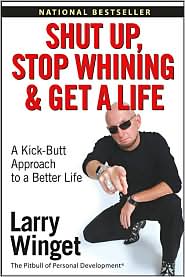Kriza srednjih godina
Poslato: 30 Jul 2008, 02:11
Midlife crisis uglavnom definisu kao period koji nastaje kada osoba shvati da je definitivno prosla mladost i da se starost primice.
Uglavnom nastaje izmedju 40. i 60. godine zivota.
Simptomi:
~zelja za promenom u zivotu/karijeri/vezama/izgledu...
~osecaj potistenosti zbog nepostignutih ciljeva iz mladosti
~zelja da se izgleda/oseca mladje
~zelja da se vise vremena provodi u specificnom okruzenju ili samoci
~odabir za tu osobu netipicne odece, nakita, automobila (ovo je ono kad kupe sportska kola, iako im realno treba nesto prakticno, zbog dece), motora, gadgeta...
~depresija
~konstantno obracanje paznje na fizicki izgled
~ljubavnik/ca
~potreba za promenom i avanturom
Sa druge strane, ima i ovakvih misljenja:
Crisis? Maybe He’s a Narcissistic Jerk
By RICHARD A. FRIEDMAN, M.D.
Published: January 15, 2008
With the possible exception of “the dog ate my homework,” there is no handier excuse for human misbehavior than the midlife crisis.
Popularly viewed as a unique developmental birthright of the human species, it supposedly strikes when most of us have finally figured ourselves out — only to discover that we have lost our youth and mortality is on the horizon.
I recently heard about a severe case from a patient whose husband of nearly 30 years abruptly told her that he “felt stalled and not self-actualized” and began his search for self-knowledge in the arms of another woman.
Outraged and curious, she followed him one afternoon and was shocked to discover that her husband’s girlfriend was essentially a younger clone of herself, right down to her haircut and her taste in clothes.
It doesn’t take a psychoanalyst to see that her husband wanted to turn back the clock and start over. But this hardly deserves the dignity of a label like “midlife crisis.” It sounds more like a search for novelty and thrill than for self-knowledge.
But you have to admit that “I’m having a midlife crisis” sounds a lot better than “I’m a narcissistic jerk having a meltdown.”
The main culprit, I think, is our youth-obsessed culture, which makes a virtue of the relentless pursuit of self-renewal. The news media abound with stories of people who seek to recapture their youth simply by shedding their spouses, quitting their jobs or leaving their families. Who can resist?
Richard A. Friedman is a professor of psychiatry at Weill Cornell Medical College.
(ceo tekst: http://www.nytimes.com/2008/01/15/healt ... 9a&ei=5070 )
Uglavnom nastaje izmedju 40. i 60. godine zivota.
Simptomi:
~zelja za promenom u zivotu/karijeri/vezama/izgledu...
~osecaj potistenosti zbog nepostignutih ciljeva iz mladosti
~zelja da se izgleda/oseca mladje
~zelja da se vise vremena provodi u specificnom okruzenju ili samoci
~odabir za tu osobu netipicne odece, nakita, automobila (ovo je ono kad kupe sportska kola, iako im realno treba nesto prakticno, zbog dece), motora, gadgeta...
~depresija
~konstantno obracanje paznje na fizicki izgled
~ljubavnik/ca
~potreba za promenom i avanturom
Sa druge strane, ima i ovakvih misljenja:
Crisis? Maybe He’s a Narcissistic Jerk
By RICHARD A. FRIEDMAN, M.D.
Published: January 15, 2008
With the possible exception of “the dog ate my homework,” there is no handier excuse for human misbehavior than the midlife crisis.
Popularly viewed as a unique developmental birthright of the human species, it supposedly strikes when most of us have finally figured ourselves out — only to discover that we have lost our youth and mortality is on the horizon.
I recently heard about a severe case from a patient whose husband of nearly 30 years abruptly told her that he “felt stalled and not self-actualized” and began his search for self-knowledge in the arms of another woman.
Outraged and curious, she followed him one afternoon and was shocked to discover that her husband’s girlfriend was essentially a younger clone of herself, right down to her haircut and her taste in clothes.
It doesn’t take a psychoanalyst to see that her husband wanted to turn back the clock and start over. But this hardly deserves the dignity of a label like “midlife crisis.” It sounds more like a search for novelty and thrill than for self-knowledge.
But you have to admit that “I’m having a midlife crisis” sounds a lot better than “I’m a narcissistic jerk having a meltdown.”
The main culprit, I think, is our youth-obsessed culture, which makes a virtue of the relentless pursuit of self-renewal. The news media abound with stories of people who seek to recapture their youth simply by shedding their spouses, quitting their jobs or leaving their families. Who can resist?
Richard A. Friedman is a professor of psychiatry at Weill Cornell Medical College.
(ceo tekst: http://www.nytimes.com/2008/01/15/healt ... 9a&ei=5070 )
